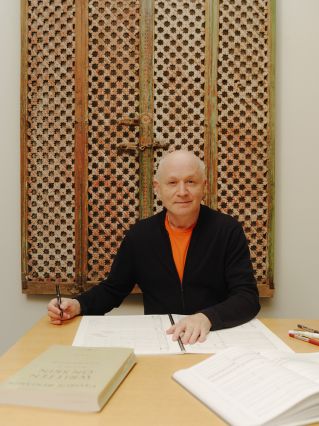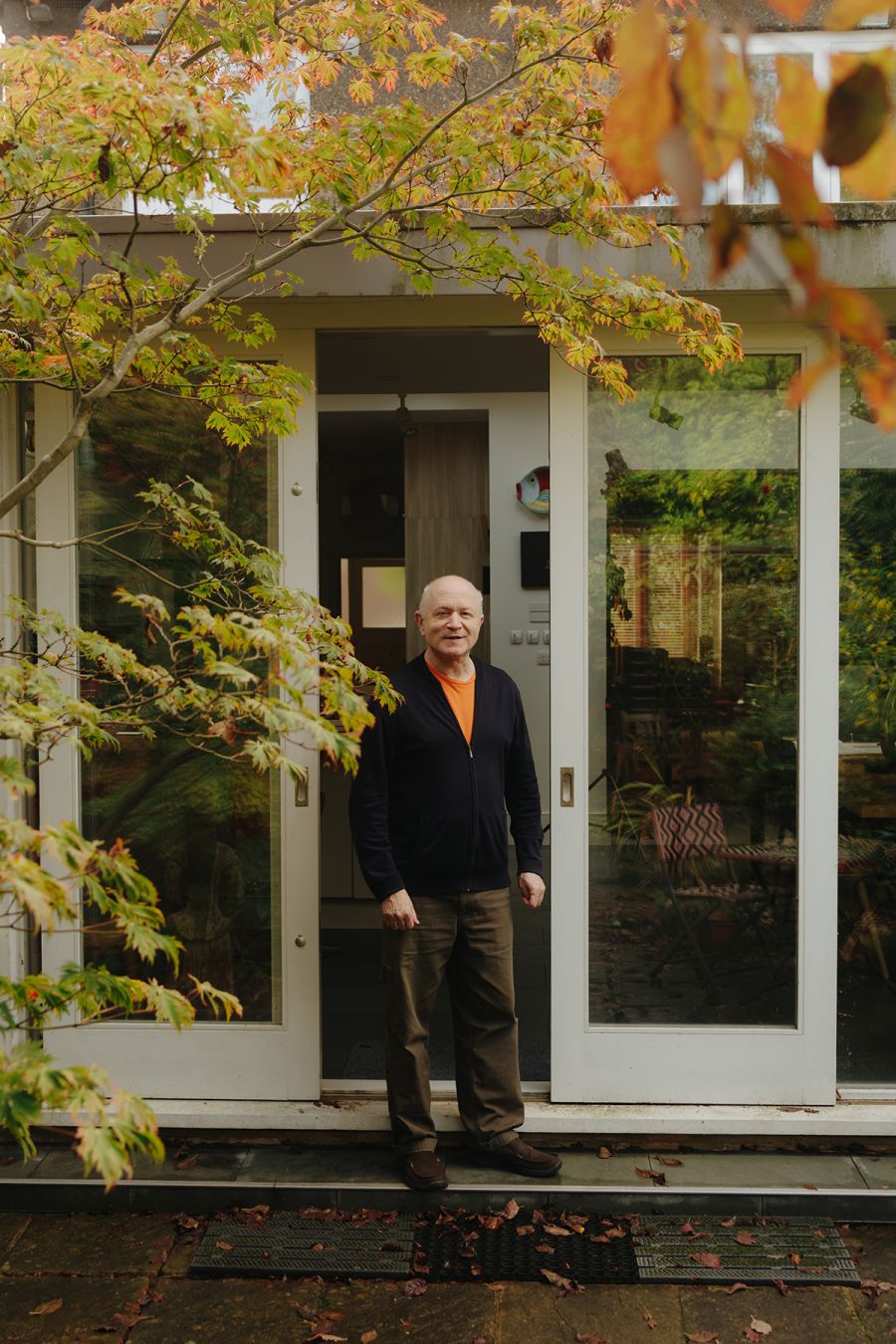George Benjamin – Mein Seelenort: Ein Garten in London - Deutsche Oper Berlin
From Libretto #5 (2023/24)
George Benjamin – My place of serenity: A garden in London
George Benjamin is one of the top composers working today. This is the first-ever staging of his opera WRITTEN ON SKIN at a Berlin venue. Here he shows us his oasis.
My private place of peace and tranquillity is my garden. It’s narrow but almost 30 metres long at a guess. I don’t have green fingers and it’s pretty chaotic, which is quite typical for a London garden and is one reason why the city is so big: the terraced houses all have a garden out back which adds up to quite a lot of space.
My garden gives me the feeling of living in the country. There are tall trees that block the view from the neighbours and make you feel protected, which is good when I’m writing and composing. I can kick back here, unwind and tap into an inner stillness when I’m working. We’ve lived in this house for 30 years and it’s here that I’ve written all my operas, WRITTEN ON SKIN included. There’s a main road not far away, but it’s hardly audible; birds are pretty much the only thing you hear: swallows, blackbirds, and I’ve seen an owl and a woodpecker. Blackbirds are a common sight, but owls and woodpeckers? You get quite a buzz seeing them.
Now, I could wander around in the garden and use it as a thinking space for my work as a creative artist, but I never use it for that purpose. All the pacing up and down in that sense is done indoors in my study. At the beginning of a new work in progress I walk round and round continuously like a caged beast, blocking out the external environment, not going out or seeing people at all. It’s the only way I can properly tap into what’s inside me – and that’s essential for anyone trying to compose.

I’d never let you into my study. It’s off-limits to everyone [laughing]! Except to people like Martin Crimp, the author, who I’m privileged to be collaborating with on my operas, WRITTEN ON SKIN included. Martin is a great friend of mine, so clever and witty and interesting. He’s always welcome and I so appreciate what he’s given me and continues to give me. And when he’s got his head down, working away at a piece of writing, I may not hear from him for six or eight months – fruitful pauses within our friendship, if you will.
Writers of opera need solitude, long periods of it. Telephones disconnected, no computer. I can happily do 12 hours at a stretch in my room when I’m writing. When I return home from a conducting tour, I need a few weeks to get back into my ‘tunnel’. It’s a bit like winding down the metabolic rate.
The garden is what gives me peace and quiet, and the study is where I go to focus, but the place that’s most important to me in my creative process is the space between my ears. The physical location is secondary; the important thing is to shut out the outside world, whatever it takes. So my first job is to almost hypnotise myself to achieve that – so I can narrow the possible notes down to the one I finally plump for.
When I’m composing, I also have the singers I’m writing for in mind. Not that I’m ever writing for a particular singer’s voice, even if it’s a person I know very well like Barbara Hannigan, who sang Agnès, the patriarch’s wife who hooks up with the boy/angel, in the world premiere of WRITTEN ON SKIN over ten years ago. I’m dealing with the singing as an artistic process, the question of how singing, as distinct from the bare words, can evoke different forms of understanding and feeling.
The quirks of individual singers are a huge source of inspiration for me. I work the sound of the voices into my orchestration. While they’re singing in the foreground, I insert a viola da gamba or muted trombone in the background. It may well be that I know which singer sings which notes the strongest, and that feeds into the melodic strands. For instance, Barbara Hannigan does a drop-dead amazing high A flat! I used it at strategic points in the 90-minute span of WRITTEN ON SKIN. It was similar with Christopher Purves, the bass-baritone: his E is gorgeously powerful, so when the »protecting« patriarch has an especially authoritarian or violent scene, we get his astonishing E. But a singer’s weak points also have their uses for a composer. If I know we’re nudging the boundaries of what a singer can or is happy to do, it can add something to the singer’s portrayal of that character. We have such a free hand as composers that we can pretty much do anything we want.

As you can see, my private place of serenity is probably the music after all, although it could also be a person in the soulful sense. Michael, my partner and soulmate, is one such person. We’ve been together for 35 years. I wouldn’t have done any of my stuff without him. And then there are a tiny number of really close friends. Two or three work in music, a couple of others in totally different areas. And not forgetting my nieces, who are now in their thirties. None of my music stuff even features on their radar and I love that. Marvellous!





